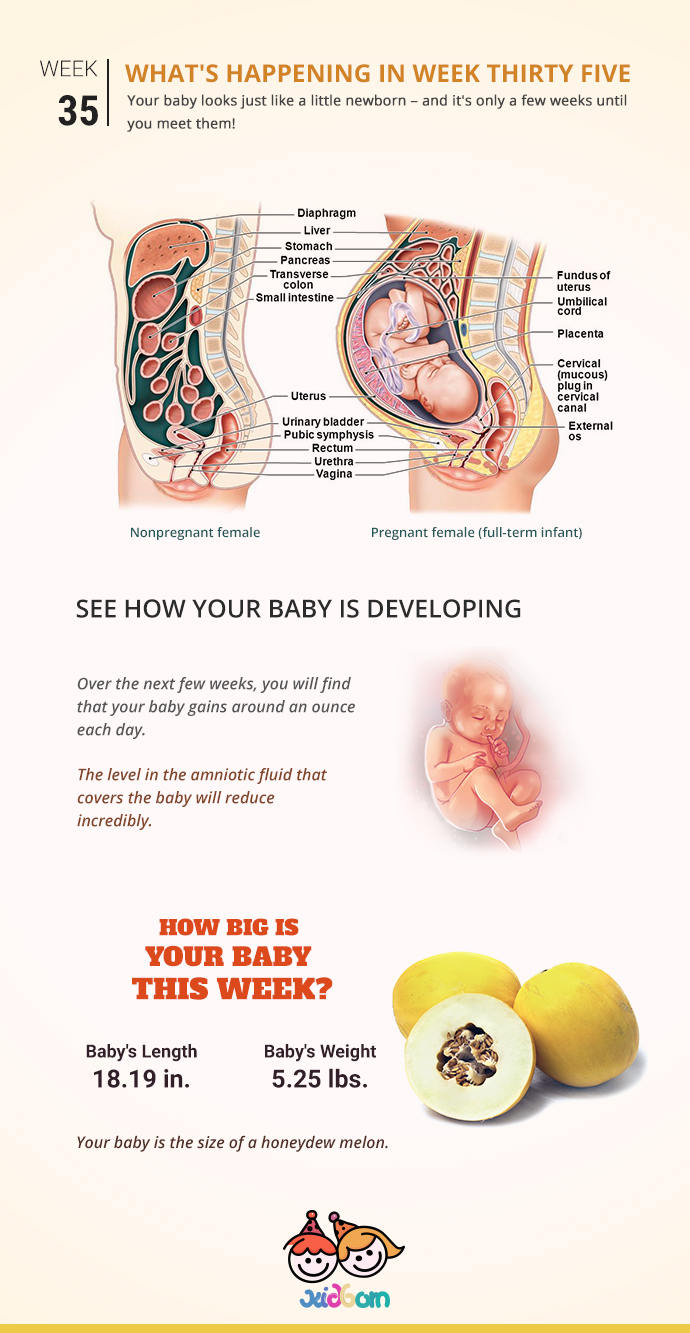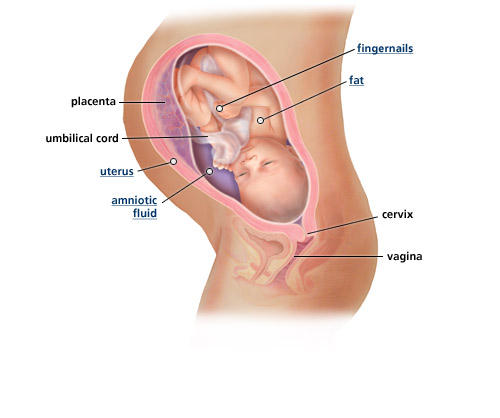
Your due date is nearing!! Now your baby looks just like a newborn. Within a few weeks, you will be holding him/her in your arms.
The baby now has only some more weeks inside the womb, and they are now nearly set for life outside the belly! The little one will be now at around 5.5lbs in weight. He/she will be approximately 50cm in length.
Now that they have grown much they have also been practising sucking movements. This way they are getting ready to latch on for that first post-birth breastfeeding. They will be beginning to move further below your pelvis all set for D-day.
The baby now looks like a newborn, and by the time they are born, they will increase a bit more weight. At present, they have nearly 15% fat on their body. However, this will be closer to 30% in a few weeks time, before they are born.

Only five percent of the babies are born on their actual due date. And hence you might think of each and every twitch and ache as an indication of the impending labour. If at all your baby arrives now, they will still be regarded moderately as premature. However, they would most likely be totally fine with a bit of extra care.
As you have reached week 35, you need to make sure that you have set your hospital bags ready and good to go. Also be certain that your freezer is loaded with lots of batch-baked meals, and the cupboards are also completely stocked.
It’s also an excellent idea to have all your major phone numbers (such as maternity unit, GP, etc.) entered somewhere accessible for everyone. Moreover, you should also make sure that everybody knows what they have to be doing once you go into labour. This is mainly important if you have other children to plan childcare or school run picks up and drop offs.
The baby is now over 18 inches long and weighs about 5 1/4 pound. He/she id now about the size of a honeydew melon. They now will find it difficult to move about in the less space available in the womb. Since it’s so comfortable in your womb, he/she isn’t likely to be performing somersaults anymore, although the number of times he kicks will remain about the same. His/her kidneys are completely developed now, and his/her liver can process some waste outputs. Most of his primary physical development is now total. He’ll spend the following few weeks increasing more weight.
The cute little bundle of joy is in preparation for birth, and he is now upside down in the uterus.
Baby’s Length: The length of the baby will now be around 18.19 inches.
Baby’s Weight: The baby will weigh approximately 5.25 lbs.

Amniotic fluid: The amniotic fluid that surrounds your baby will begin to reduce.
Fat: Your baby will spend the following few weeks adding on weight at the rate of around one ounce each day.
Uterus: The uterus now would have expanded to about 15 times its initial volume and is poking up under your ribs.

Your uterus, which was totally tucked away inside your pelvis when you conceived, now reaches up to below your rib cage. If you could view inside your womb, you’d find that there’s more baby than the amniotic fluid in there now. Your uterus, which is growing in size is crowding your other internal organs, too, which is why you are likely to pee more often and may be dealing with heartburn and perhaps other gastrointestinal distress. If you do not have any of these annoyances, then you are one lucky lady.
It is at this point that you will need to go to the doctor or your midwife every week. Sometime between this stage and 37 weeks, the doctor will do a vaginal and rectal culture in order to check for a bacterium called group B streptococcus or GBS. GBS is generally harmless in adults, but if you do possess it and pass it on to your baby during the delivery, it can create serious complications, like meningitis, pneumonia or a blood infection. Around 10 to 30% of pregnant women have the bacteria and don’t know it, it’s important to be screened. (The bacteria will come and go on their own – that’s is the reason why you weren’t tested earlier in pregnancy.) If you’re a GBS carrier, then you’ll get IV antibiotics during labour, which will significantly reduce your baby’s chance of infection.
This is also an excellent time to form a birth plan. The childbirth is unpredictable, and the odds are that you won’t follow your plan to the word, but thinking about your preferences ahead of time – and sharing your choices with your doctor or your midwife – should take some of the stress out of the process.
It is the most powerful creation to have life growing inside of you.There is no bigger gift